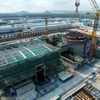The Cambodian Ministry of Environment on June 9 signed with the United Nations' Food and Agriculture Organisation (FAO) a cooperation agreement that aims to enable its farmers to increasingly adapt to climate change.
The agreement will help carry out a 5-million USD project, which is funded by the Global Environmental Facility, in rural communities in the provinces of Kampong Thom, Siem Reap, Preah Vihear and Ratanakiri.
Speaking at the signing ceremony, FAO representative in Cambodia Nina Brandstrup stressed that the project is an important contribution to assisting Cambodian rural communities in adapting to climate variability and protecting their livelihoods.
Agriculture is one of the key backbones of Cambodia’s economy with the involvement of about 70 percent of its population. In recent years, the sector has enjoyed a stable average growth between 3-4 percent per year, contributing to not only ensuring the national food security but also helping the country become a rice exporter.
However, experts are still concerned about sustainability of the country’s agricultural sector due to its backward production techniques and virtual dependence on natural factors.-VNA
The agreement will help carry out a 5-million USD project, which is funded by the Global Environmental Facility, in rural communities in the provinces of Kampong Thom, Siem Reap, Preah Vihear and Ratanakiri.
Speaking at the signing ceremony, FAO representative in Cambodia Nina Brandstrup stressed that the project is an important contribution to assisting Cambodian rural communities in adapting to climate variability and protecting their livelihoods.
Agriculture is one of the key backbones of Cambodia’s economy with the involvement of about 70 percent of its population. In recent years, the sector has enjoyed a stable average growth between 3-4 percent per year, contributing to not only ensuring the national food security but also helping the country become a rice exporter.
However, experts are still concerned about sustainability of the country’s agricultural sector due to its backward production techniques and virtual dependence on natural factors.-VNA



















